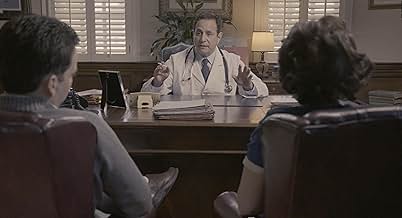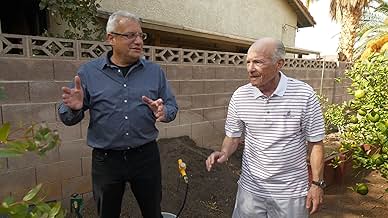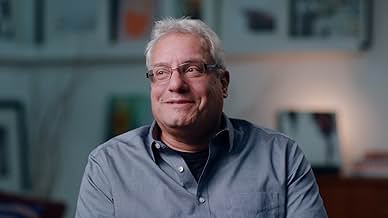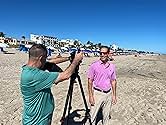Cuando Jon Baime, de 54 años, se somete a una prueba de ADN, su mundo y su sentido de la propia identidad se ven destrozados por un secreto familiar.Cuando Jon Baime, de 54 años, se somete a una prueba de ADN, su mundo y su sentido de la propia identidad se ven destrozados por un secreto familiar.Cuando Jon Baime, de 54 años, se somete a una prueba de ADN, su mundo y su sentido de la propia identidad se ven destrozados por un secreto familiar.
- Dirección
- Guión
- Reparto principal
- Premios
- 2 premios en total
Reseñas destacadas
You can tell this is a man who hasn't had a tough life , in part due to his Church we are in our 50s what are you thinking parents , and yet , he has such little empathy for either of them. Maybe it's his overly pandering , childish way of telling his story rather than just telling it. It's as if he feels like unless he gives us cues we won't pick up on the nuances. Unless you were adopted or found something similar out in your own life, I can't see or find anything insightful or new or interesting about this rendering. It comes across as pandering and childish . The most interesting thing for me was seeing Johnny Carson before the tonight show. The way they speak of and try and trap their 93 yr old father is unbelievable. These boys have never had a day of real heart ache in their lives.
"Filling in the Blanks": Unveiling Paternal Identities in a Modern Tale
"Filling In the Blanks" is a poignant and thought-provoking documentary that delves deep into the lives of middle-aged individuals who discover the truth about their biological fathers through proprietary DNA analysis. Directed with finesse and sensitivity, the film offers a revelatory exploration of identity, family dynamics, and the emotional rollercoaster that accompanies such unexpected revelations.
The film's central character, a middle-aged man grappling with the shock of discovering his true biological heritage, becomes the audience's guide through this complex journey of self-discovery. Through direct interviews, viewers are granted intimate access to the raw emotions of not only the protagonist but also his newfound brothers and sisters who share the same extraordinary situation. The documentary expertly captures their diverse range of reactions, highlighting that there is no one-size-fits-all response to such life-altering news.
One of the most compelling aspects of the documentary is its exploration of the varying emotional landscapes of the siblings. Some are genuinely surprised, while others experience a profound sense of relief, shedding the unwanted baggage of their non-biological fathers. Amidst these disparate reactions, one common thread emerges - the unwavering love and dedication of their mothers, regardless of the paternal complexities. This underscores the powerful and enduring bonds that tie families together, transcending the boundaries of biology.
As the narrative unfolds, the film deftly navigates the multifaceted layers of the human experience. It shines a spotlight on the societal shifts and attitudes of the past, specifically addressing the reluctant acceptance of artificial insemination during the 1960s. This contextual backstory adds depth to the broader discussion on identity and challenges our perceptions of family structures. The filmmakers are careful to present a balanced portrayal, allowing the audience to ponder the complexities and ethical considerations surrounding artificial insemination.
An engaging and heartwarming subplot centers around the siblings' journey to connect with their biological father. The documentary captures their excitement and trepidation as they embark on this unique quest for self-discovery. The genuine warmth and openness of the biological father as he welcomes his newfound children into his life provide a touching counterpoint to the initial shock of the revelations. His willingness to share his medical history and personal experiences helps foster a sense of closure and understanding for the siblings, who yearned for a connection that had been concealed from them for so long.
"Filling in the Blanks" excels in its ability to provoke introspection and dialogue on sensitive subjects. It raises important questions about the timing and necessity of disclosing the truth in cases of artificial insemination, highlighting the evolving perspectives on transparency and the potential impact on individual well-being. The documentary serves as a catalyst for conversations surrounding family secrets, the evolving nature of family structures, and the significance of genetic ties.
In conclusion, "Filling in the Blanks" is a captivating documentary that masterfully captures the complexities of identity, family, and the profound impact of newfound revelations. With its insightful storytelling and candid interviews, the film prompts viewers to reflect on their own perceptions of family and the power of genetic connections. By shedding light on the deeply personal experiences of the characters, the documentary succeeds in its mission to illuminate the intricate tapestry of human relationships and the transformative power of truth.
The film's central character, a middle-aged man grappling with the shock of discovering his true biological heritage, becomes the audience's guide through this complex journey of self-discovery. Through direct interviews, viewers are granted intimate access to the raw emotions of not only the protagonist but also his newfound brothers and sisters who share the same extraordinary situation. The documentary expertly captures their diverse range of reactions, highlighting that there is no one-size-fits-all response to such life-altering news.
One of the most compelling aspects of the documentary is its exploration of the varying emotional landscapes of the siblings. Some are genuinely surprised, while others experience a profound sense of relief, shedding the unwanted baggage of their non-biological fathers. Amidst these disparate reactions, one common thread emerges - the unwavering love and dedication of their mothers, regardless of the paternal complexities. This underscores the powerful and enduring bonds that tie families together, transcending the boundaries of biology.
As the narrative unfolds, the film deftly navigates the multifaceted layers of the human experience. It shines a spotlight on the societal shifts and attitudes of the past, specifically addressing the reluctant acceptance of artificial insemination during the 1960s. This contextual backstory adds depth to the broader discussion on identity and challenges our perceptions of family structures. The filmmakers are careful to present a balanced portrayal, allowing the audience to ponder the complexities and ethical considerations surrounding artificial insemination.
An engaging and heartwarming subplot centers around the siblings' journey to connect with their biological father. The documentary captures their excitement and trepidation as they embark on this unique quest for self-discovery. The genuine warmth and openness of the biological father as he welcomes his newfound children into his life provide a touching counterpoint to the initial shock of the revelations. His willingness to share his medical history and personal experiences helps foster a sense of closure and understanding for the siblings, who yearned for a connection that had been concealed from them for so long.
"Filling in the Blanks" excels in its ability to provoke introspection and dialogue on sensitive subjects. It raises important questions about the timing and necessity of disclosing the truth in cases of artificial insemination, highlighting the evolving perspectives on transparency and the potential impact on individual well-being. The documentary serves as a catalyst for conversations surrounding family secrets, the evolving nature of family structures, and the significance of genetic ties.
In conclusion, "Filling in the Blanks" is a captivating documentary that masterfully captures the complexities of identity, family, and the profound impact of newfound revelations. With its insightful storytelling and candid interviews, the film prompts viewers to reflect on their own perceptions of family and the power of genetic connections. By shedding light on the deeply personal experiences of the characters, the documentary succeeds in its mission to illuminate the intricate tapestry of human relationships and the transformative power of truth.
10beebooba
With the advances in genetic testing, the list of people receiving "DNA suprises" from places like 23andMe and Ancestry keeps growing. Everyone's story is different, but the outcome remains the same: what would you do if you suddenly found out you were not genetically related to your father? Jon's experience is an interesting one and he tells it with refreshing candor and a lack of sensationalism. Some of the vintage footage is great, and there are many surprisingly intimate moments captured on camera. I won't spoil any of the revelations, but if you are curious about DNA and the intersection of science and personal experience, you will enjoy this film. Similar docs include THREE IDENTICAL STRANGERS and OUR FATHER.
As "Filling In the Blanks" (2023 release; 95 min), we are introduced to Jon Baime, 54 yo, as he is getting ready to take a DNA test. We then go back in time as we get archival footage from the 1960s of Jon and his family (mom and dad, and 2 older brothers) growing up in the New Jersey suburbs. Turns out that dad is quite moody... At this point we are 10 minutes into the documentary.
Couple of comments: this movie is the labor of love by Jon Baime, as narrator, writer, producer and director of this (and, oh yea, he stars as well). Baime makes an unexpected discovery of a deeply held family secret, and once he finds out, the question is what he does with that information. I won't divulge anything more. The documentary could've gone in several ways but in the end, Baime, a very likable "Joe Sixpack" kinda guy, turns this into an uplifting story about unexpected family secrets. As such, the movie flies by in non time.
"Filling In the Blanks" recently started streaming on Amazon Prime, where I caught it a few days ago. If you are in the mood for an uplifting documentary, I'd readily suggest you check it out and draw your own conclusion.
Couple of comments: this movie is the labor of love by Jon Baime, as narrator, writer, producer and director of this (and, oh yea, he stars as well). Baime makes an unexpected discovery of a deeply held family secret, and once he finds out, the question is what he does with that information. I won't divulge anything more. The documentary could've gone in several ways but in the end, Baime, a very likable "Joe Sixpack" kinda guy, turns this into an uplifting story about unexpected family secrets. As such, the movie flies by in non time.
"Filling In the Blanks" recently started streaming on Amazon Prime, where I caught it a few days ago. If you are in the mood for an uplifting documentary, I'd readily suggest you check it out and draw your own conclusion.
I just want to say this documentary is not only Well-Conceived, but also Well-Delivered..... I know, I know, but puns are fun though!
The honest truth is I enjoyed this so much. And it is very interesting sociologically. This show plays very similarly in tone and speed of discovery as another show that I enjoy, "Finding Your Roots" on PBS. Of course the people discovering their genetic family tree are famous people.
So I think it stands as a compliment to Filling in the Blanks" (which if you think about it is a really good pun as well!) -that it is just as well written, directed, played and produced as a PBS broadcast show. In my honest opinion that is. I really just believe the way these ladies and gentlemen handled these secrets is tremendous. Not only the children but the parents as well. Also, without spoiling it, the ending is a BRILLIANT wrap to the whole tale.
The honest truth is I enjoyed this so much. And it is very interesting sociologically. This show plays very similarly in tone and speed of discovery as another show that I enjoy, "Finding Your Roots" on PBS. Of course the people discovering their genetic family tree are famous people.
So I think it stands as a compliment to Filling in the Blanks" (which if you think about it is a really good pun as well!) -that it is just as well written, directed, played and produced as a PBS broadcast show. In my honest opinion that is. I really just believe the way these ladies and gentlemen handled these secrets is tremendous. Not only the children but the parents as well. Also, without spoiling it, the ending is a BRILLIANT wrap to the whole tale.
Selecciones populares
Inicia sesión para calificar y añadir a tu lista para recibir recomendaciones personalizadas
- How long is Filling in the Blanks?Con tecnología de Alexa
Detalles
Taquilla
- Presupuesto
- 210.000 US$ (estimación)
- Duración1 hora 34 minutos
- Color
- Relación de aspecto
- 16:9 HD
Contribuir a esta página
Sugerir un cambio o añadir el contenido que falta




















